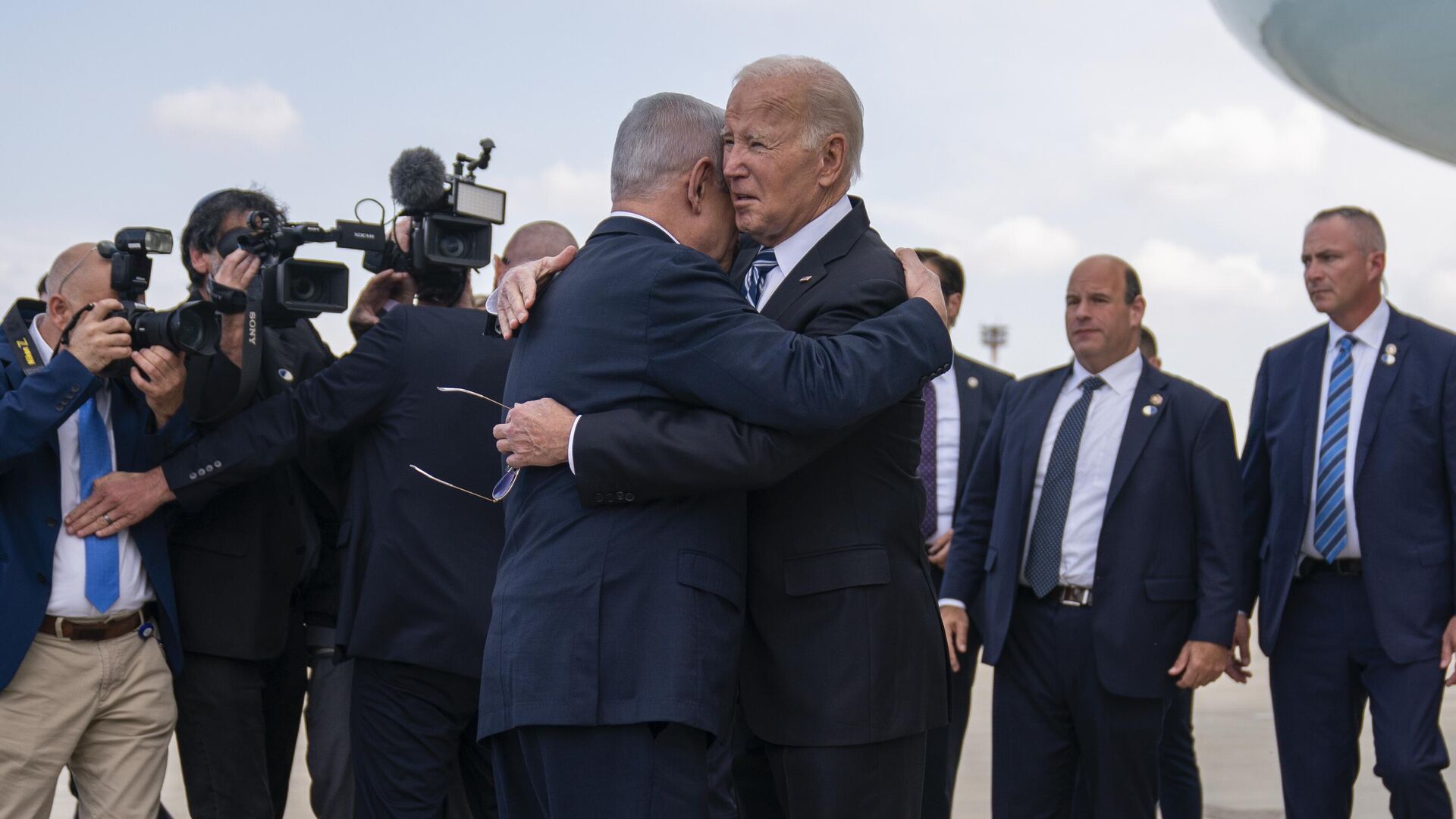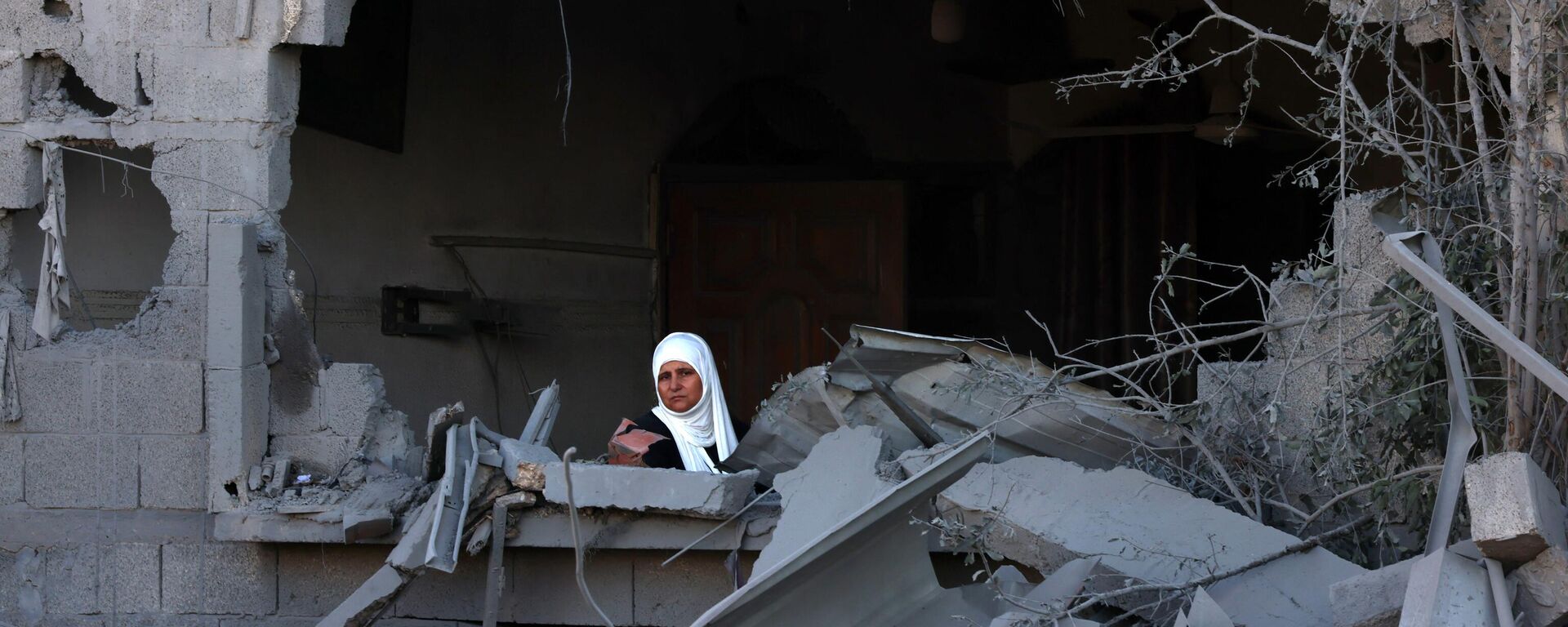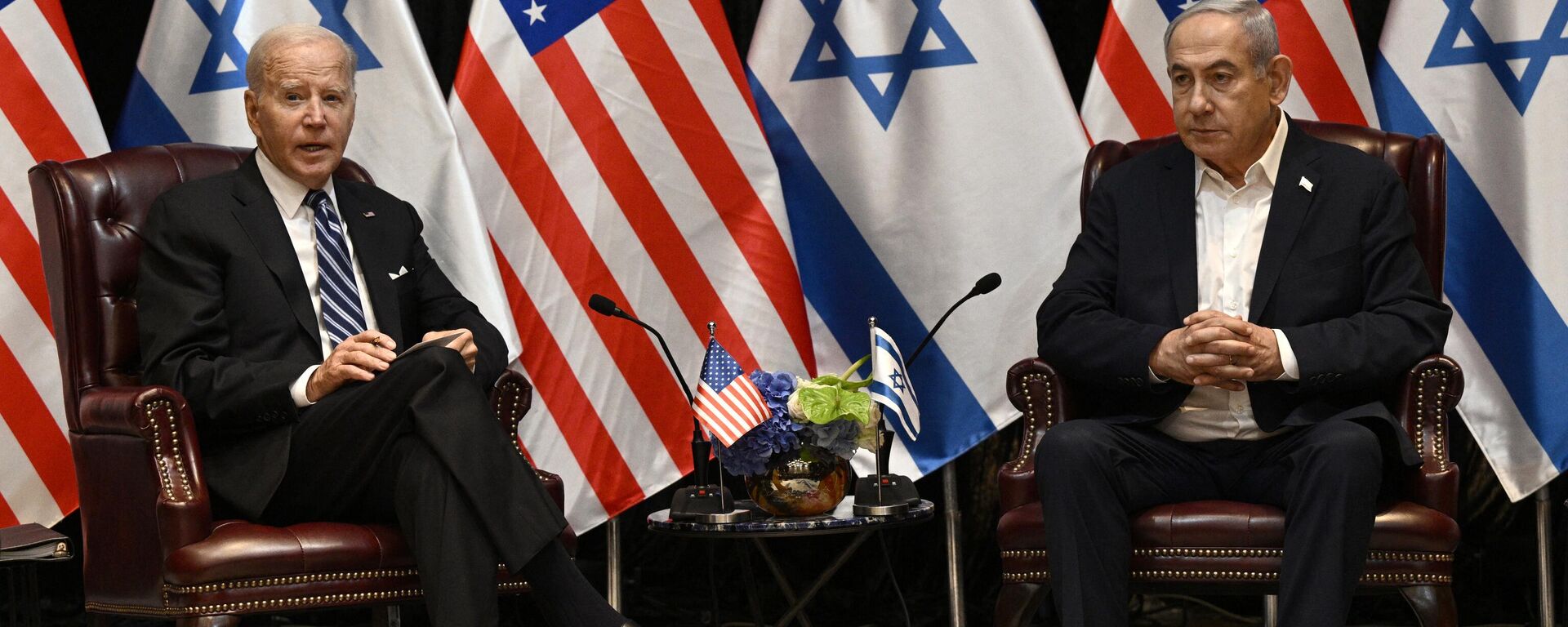US’ Blind Support for Israel Gives China ‘Powerful Advantage’ to Woo Arab World
19:18 GMT 22.10.2023 (Updated: 10:27 GMT 30.01.2024)

© AP Photo / Evan Vucci
Subscribe
The fighting in southern Israel and the Gaza Strip has been accompanied by diplomatic battles waged at the United Nations by Israel’s staunchest allies on one side and countries seeking an urgent ceasefire on the other. Middle East politics expert Dr. Shaun Narine explains why Washington’s blind support for Tel Aviv may end up costing it dearly.
The United States tabled a draft Security Council resolution on Saturday emphasizing Tel Aviv’s “inherent right of individual and collective self-defense,” condemning Hamas for its surprise October 7 offensive, demanding the immediate and unconditional release of hostages, and accusing Iran of supporting “militias and terrorist groups threatening peace and security across the region.”
The American resolution, drafted after the US vetoed Russia and Brazil-sponsored resolutions calling for an urgent “humanitarian pause” to the conflict, makes no mention of a ceasefire.
Russian deputy permanent representative to the UN Dmitry Polyanskiy berated his US counterparts for vetoing the Russian-proposed resolution. “The masks are off. No matter how hard the Americans tried to appear as peacekeepers, they ultimately failed. A huge foreign policy failure for Washington,” Polyanskiy said on Wednesday.
China’s Foreign Ministry expressed Beijing’s ‘deep disappointment’ with Washington’s “obstruction” of the Security Council’s efforts to put a stop to the violence. On Saturday, Chinese special Middle East Envoy Zhai Jun urged the UN to “convene a more authoritative, influential and wide-ranging international peace conference” on the Palestinian-Israeli crisis “as soon as possible, so as to pool international consensus on promoting peace, as well as a comprehensive, just and lasting solution to the Palestinian issue.”
Washington’s staunch support for Israel at the UN followed the publication of a State Department memo last week instructing American diplomats not to use words and phrases like “ceasefire,” “end to violence/bloodshed,” “restoring calm,” and “de-escalation/ceasefire” in reference to the Palestinian-Israeli crisis.
Instead, President Biden staged a rare televised address to the nation on Thursday in which he promised unequivocal US support to “our critical partners, including Israel and Ukraine,” and vowed that the “smart investment” of $100+ billion in US taxpayer money would “pay dividends for American security for generations” to come.
‘Buying Time’
“The US is basically just running interference for Israel,” Dr. Shaun Narine, a professor of international relations and political science at St. Thomas University in New Brunswick, Canada, told Sputnik.
“They’re buying Israel time for it to launch a more concerted campaign against Gaza. So they’re really just blocking any kind of diplomatic initiatives. It's a bit ironic and maybe even perverse for the [American] ambassador to claim that they need to give diplomacy more time to work on the ground when I think the real objective is actually to avoid any kind of diplomatic resolution to buy Israel this extra time. Now with that being said, I don't necessarily think the Americans know exactly what Israel wants to do with the time,” the academic said.
Commenting on the US-proposed UN draft resolution’s language about Israel’s right to self-defense, Dr. Narine confirmed that theoretically, yes, “according to international law, states have a right to self-defense.” However, this right “has to be proportional to the situation to which they’re responding,” he stressed.
“I think Israel is in a very difficult position in that sense, because what does ‘proportional’ mean? They’ve said they want to target and they want to destroy Hamas. And so attacking Hamas would be proportional…Unfortunately for them, Hamas is dug in. It’s in the Gaza Strip. It has a network of tunnels underneath Gaza. And so attacking Hamas directly would mean attacking, trying to attack those tunnels. And obviously, those are under civilian infrastructure. And so in the course of doing so, Israel is also going to be attacking civilians,” the academic explained.
But Israel doesn’t appear “overly concerned” about the prospect of civilian casualties, in Narine’s estimation, with the professor pointing to Israel’s record of regularly “mowing the grass” in Gaza – a reference to the military operations the IDF seems to launch in the Strip on a regular basis.
Israel’s response to attacks against it has “always been disproportionate,” the professor emphasized.
Tel Aviv has already been violating international humanitarian law with its decade-and-a-half long blockade against Gaza, Narine noted, emphasizing that this “is the larger context, or frankly, the smaller, slightly larger context in an even larger context” of the Palestinian-Israeli crisis – which he said is rooted in successive Israeli governments’ staunch opposition to the idea of a viable Palestinian state.
America’s Self-Destructive Israel Policy
US policy toward Israel is “driven primarily by domestic politics,” the academic noted, with its response to the October 7 escalation dictated by the “shock” experienced by Jews inside the United States and around the world, resulting in Washington’s “unlimited, unconditional support.” Biden personally “has been dedicated strongly to Israel for his entire political career,” Dr. Narine recalled.
Unfortunately for Washington, the US’s blind support for Israel, and its seeming lack of concern about Palestinian lives to anywhere near the same degree as Israeli ones is proving politically damaging to US foreign policy, the academic noted, since it sends “a very unfortunate message to the Arab World” about Washington’s priorities.
“Even beyond the Arab World, there are African politicians who have made clear that they’re looking at the American response in the UN Security Council, and they’re saying, ‘yes, this is about Palestinian lives not mattering, maybe the lives of people in the Global South not mattering that much.’”

22 October 2023, 10:01 GMT
In that sense, Dr. Narine believes that viewed from the lens of America’s global competition with China, Beijing “stands to gain quite a bit in the Arab World by taking a more evenhanded approach to the conflict between Palestine and Israel, but also even weighing more towards the Arab side in this.”
“So the Americans are giving the Chinese a really powerful advantage potentially in this context,” but “doing it anyway because their calculations are not driven by those foreign policy concerns at this moment,” the academic summed up.



